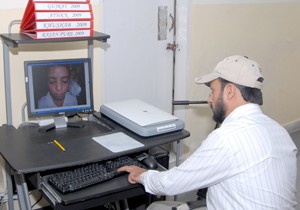
Occasional illness is a natural part of growing up, but nine-yearold Fauzia was miserable most all of the time. Recurring ear and throat pain led her worried parents to take the girl to a nearby health clinic in Attock, a district capital in Pakistan’s Punjab province.
During the consultation, a specialist diagnosed an acute case of tonsillitis, and scheduled surgery to remove her tonsils at Holy Family Hospital in Rawalpindi, about 50 miles away from the clinic. Following the successful operation, Fauzia went back to the clinic for follow-up appointments, and was soon happy and healthy again.
What made Fauzia’s treatment unique was that her diagnosis and post-surgery consultations all took place using the new technique of telemedicine. Through an online computer, she was able to receive care from a hospital specialist literally miles away using technology so advanced that her doctor could diagnose her condition within minutes.
With USAID support, Holy Family Hospital is pioneering telemedicine – healthcare services through information and communications technologies such as videoconferencing. Holy Family serves as a hub where specialists from the hospital consult in real time with patients who visit one of eight established telemedicine sites in rural clinics in Punjab and Sindh provinces.
“This project laid the foundation for a national telemedicine network in Pakistan,” said Dr. Asif Zafar Malik, Holy Family’s project director for telemedicine. “Our collaboration with USAID led to new programs at both federal and provincial levels. We had the vision, but the pilot project really helped us demonstrate to patients and policy makers alike that this is the way to go.”
Telemedicine carries enormous promise in a country where the ratio of patients to doctors is a high 1,400-to-1, and the cost and diffi culty of travel to and from health clinics is challenging for rural Pakistanis.
Holy Family staff now shares its experience of having conducted more than 2,000 telemedicine consultations with medical personnel nationwide through courses in e-health and other applications of telemedicine, which have trained more than 100 doctors and nurses who have gone on to set up additional telemedicine centers at other hospitals.







Comment
Make a general inquiry or suggest an improvement.